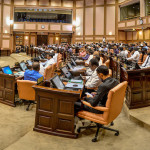The Commonwealth has a very low profile among the public, especially the young, and policymakers, according to a new global public consultation.
Less than one-third of the people interviewed as part of the Commonwealth Conversation, to mark the association’s 60th anniversary, could name any of its activities, with the majority only able to cite the Commonwealth Games.
Policymakers struggled to identify areas to the Commonwealth clearly added value. Those working in Commonwealth organisations expressed frustration that the association was being neglected by member governments and lacked an ambitious vision for its future.
“This is a wake up call for the Commonwealth. After 60 years of fantastic work, the Commonwealth has to choose between quietly retiring or boldly revitalising itself for the 21st century,” said Dr Danny Sriskandarajah, director of the Royal Commonwealth Society.
The Commonwealth Conversation surveyed tens of thousands of people across almost all its 53 member states via online and offline activities.
The investigation’s findings further revealed that the Commonwealth was “more often valued by Anglophiles and those nostalgic for an imperial past than those committed to the internationalist values of the association”.
The report suggested rebuilding the Commonwealth’s profile to highlight its principles, priorities and the people involved.
Contributing to the report, Kenyan Vice President H E Kalonzo Musyoka said, “We don’t hear the voice of the Commonwealth loud enough. It is a very well established body but I do feel that it needs a sense of renewal.”
Last week, Commonwealth heads met in Trinidad and Tobago for their annual meeting where climate change was the main topic on the agenda.
Leaders welcomed a US$10 billion climate package to help developing countries ahead of the UN climate change summit in Copenhagen this month, which analysts have argued will help revive the Commonwealth’s standing.
Non-Commonwealth leaders such as Danish Prime Minister Anders Fogh Rasmussen and French President Nicolas Sarkozy as well as United Nations Secretary General Ban Ki-Moon made appearances for the first time.
In a statement at the end of the two-day conference, leaders agreed to consider strengthening the role of the Commonwealth Ministerial Action Group (CMAG) to enable it to deal with the full range of serious and persistent violations of the association’s fundamental values.
The Maldives was included in the group, established by the Commonwealth heads of government in 1995 to uphold the Harare Declaration, which lays down the association’s fundamental values and membership criteria.
Leaders expressed concern over the deterioration in the political situation in Fiji with regard to its adherence to fundamental Commonwealth values and said they would consider Zimbabwe’s re-entry into the organisation over the next few years.
In addition to signing a climate change declaration, participants agreed to admit Rwanda as the 54th member; a decision which alarmed some human rights organisations.
Also at the summit, Sri Lanka was blocked from hosting the next meeting of Commonwealth leaders in protest at the country’s military repression against the Tamil population earlier this year.
While the Sri Lankan government succeeded in ending a 26-year civil war against the Tamil Tigers, they have been accused of widespread human rights abuses in achieving their goal.
Instead, countries voted for Australia to host next year’s conference.

